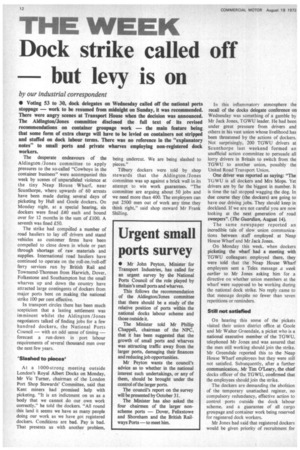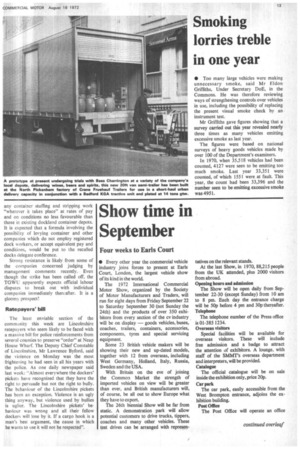Dock strike called off but levy is on
Page 14

Page 15

If you've noticed an error in this article please click here to report it so we can fix it.
by our industrial correspondent
• Voting 53 to 30, dock delegates on Wednesday called off the national ports stoppage — work to be resumed from midnight on Sunday, it was recommended.
There were angry scenes at Transport House when the decision was announced.
The Aldington/Jones committee disclosed the full text of its revised recommendations on container gronpage work — the main feature being that some form of extra charge will have to be levied on containers not stripped and stuffed on dock labour terms. There was no reference in the "explanatory notes" to small ports and private wharves employing non-registered dock workers.
The desperate endeavours of the Aldington /Jones committee to apply pressures to the so-called "Cowboys in the container business" were accompanied this week by scenes of unparalleled violence at the tiny Neap House Wharf, near Scunthorpe, where upwards of 60 arrests have been made during several days of picketing by Hull and Goole dockers. On Monday night, at a special hearing, six dockers were fined £40 each and bound over for 12 months in the sum of £100. A seventh was fined £50.
The strike had compelled a number of road hauliers to lay off drivers and stand vehicles as customer firms have been compelled to close down in whole or part through shortage of raw materials and supplies. International road hauliers have continued to operate on the roll-on /roll-off ferry services run by British Rail and Townsend-Thoresen from Harwich, Dover, Folkestone and Southampton but the small wharves up and down the country have attracted large contingents of dockers from major ports bent on making the national strike 100 per cent effective.
In transport circles there has been much scepticism that a lasting settlement was imminent whilst the Aldington /Jones negotiators talked of finding jobs for a few hundred dockers, the National Ports Council — with an odd sense of timing — forecast a run-down in port labour requirements of several thousand men over the next few years.
'Slashed to pieces* At a 1000-strong meeting outside London's Royal Albert Docks on Monday, Mr Vic Turner, chairman of the London Port Shop Stewards' Committee, said that Kent miners had promised help with picketing. "It is an indictment on us as a body that we cannot do our own work correctly," he told the dockers. "All round this land it seems we have as many people doing our work as we have got registered dockers. Conditions are bad. Pay is bad. That presents us with another problem, being undercut. We are being slashed to pieces."
Tilbury dockers were told by shop stewards that the Aldington /Jones committee was up against a brick wall in its attempt to win work guarantees. "The committee are arguing about 50 jobs and we need more than 400. The employers can put 2500 men out of work any time they think right," said shop steward Mr Frank Shilling. In this inflammatory atmosphere the recall of the docks delegate conference on Wednesday was something of a gamble by Mr Jack Jones, TGWU leader. He had been under great pressure from drivers and others in his vast union whose livelihood has been threatened by the actions of dockers. Not surprisingly, 200 TGWU drivers at Scunthorpe last weekend formed an unofficial action committee to persuade all lorry drivers in Britain to switch from the TGWU to another union, possibly the United Road Transport Union.
One driver was reported as saying: "The TGWU is all dockers and Mrs Mops. Yet drivers are by far the biggest in number. It is time the tail stopped wagging the dog. In due course they (the dockers) are going to have our driving jobs. They should keep in dockland. If we are not careful you are now looking at the next generation of road sweepers". (The Guardian, August 14).
The same newspaper reported an incredible tale of slow union communications between staff employed at Neap House Wharf and Mr Jack Jones.
On Monday this week, when dockers picketing the wharf had a meeting with TGWU colleagues employed there, they were told that the Neap House Wharf employees sent a Telex message a week earlier to Mr Jones asking him for a directive on whether union members at the wharf were supposed to be working during the national dock strike. No reply came to that message despite no fewer than seven repetitions or reminders.
Still not satisfied On hearing this some of the pickets visited their union district office at Goole and Mr Walter Greendale, a picket who is a national executive member of the TGWU, telephoned Mr Jones and was assured that the men still working should join the strike. Mr Greendale reported this to the Neap House Wharf employees but they were still not satisfied. Subsequently, after a further communication, Mr Tim O'Leary, the chief docks officer of the TGWU, confirmed that the employees should join the strike.
The dockers are demanding the abolition of the temporary unattached register, no compulsory redundancy, effective action to control ports outside the dock labour scheme, and a guarantee of all cargo groupage and container work being reserved for registered dock workers.
Mr Jones had said that registered dockers would be given priority of recruitment for
any container stuffing and stripping work "wherever it takes place" at rates of pay and on conditions no less favourable than those in existing dockland container depots. It is expected that a formula involving the possibility of levying container and other companies which do not employ registered dock workers, or accept equivalent pay and conditions, would be put to the recalled docks delegate conference.
Strong resistance is likely from some of the companies concerned judging by management comments recently. Even though the strike has been called off, the TGWU apparently expects official labour disputes to break out with individual companies immediately thereafter. It is a gloomy prospect!
Ratepayers' bill
The least enviable section of the community this week are Lincolnshire ratepayers who seem likely to be faced with a massive bill for police reinforcements from several counties to preserve "order" at Neap House Wharf. The Deputy Chief Constable of Lincolnshire, Mr Lawrence Byford, said the violence on Monday was the most frightening he had seen in all his years with the police. As one daily newspaper said last week: –Almost everywhere the dockers' pickets have recognized that they have the right to persuade but not the right to bully. The behaviour of the Lincolnshire pickets has been an exception. Violence is an ugly thing anyway, but violence used by bullies is uglier. The Lincolnshire pickets' behaviour was wrong and all their fellow dockers will lose by it. If a cargo hook is a man's best argument, the cause in which he wants to use it will not be respected".


































































































